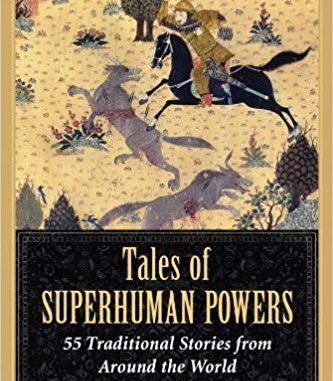
Review Fix chats with “Tales of Super Human Powers†author Csenge Virág Zalka who lets us know what inspired the book, why she’s happy McFarland and Company took a chance on it and more.
About the Book:
Csenge Virág Zalka, a Hungarian storyteller, has collected 55 folktales from around the world about supernatural abilities like superhuman strength, invulnerability, flying, heightened senses, speed, invisibility, healing, agility, precognition, telepathy, fire manipulation, teleportation, water powers, and shifting. These tales represent powers that people have dreamed of, conjured up and strived for through the ages. Many of the powers are present in popular culture, making the superheroes who wield them the direct descendants of characters such as the princess who could see through walls or the invulnerable Isfandiyar. Zalka excluded stories about magic or about gods with divine powers, and focused on less well-known stories. She included information on similar heroes, the ability in the story, sources of the powers, the origin of the story, teachings in it, the recommended age group, sources, variants, and comments.
About the Author:
Csenge Virág Zalka is a professional storyteller and researcher from Budapest, Hungary. Her interests focus on role-playing games as a form of storytelling, historical fiction, oral traditions and popular culture.
Review Fix: What inspired the creation of this book?
Zalka: I am a performing storyteller, and I also enjoy superhero comics and movies. I used to play a game with the audience, especially children, where I asked them what superpower they would choose for themselves, and then I told a traditional story (a folktale, legend, or myth) that had that same power in it. Eventually, my “superpower-repertoire” grew big enough that I decided it would be a good idea to publish it, for other storytellers and teachers to use.
Review Fix: What makes this subject worthy of a book like this in your opinion?
Zalka: Superhero stories are very popular these days. I work with traditional stories, and sometimes it is hard to find that initial connection to the audience (especially teens); “hi, I am here to tell you a folktale” does not exactly have drawing power. If I ask them about superpowers, we suddenly have something to talk about, and connect over. Dreaming about superhuman powers is universal, and it has been a part of our stories for a very long time. Superheroes did not just spring up in the 20th century out of nowhere. It was great fun to trace how the idea of their abilities manifested in stories centuries ago.
Review Fix: What was the writing process like for this one?
Zalka: I first made a list of all the superpowers I could think of, from comics and movies. Then I grouped them into categories (mental powers, physical powers, elemental powers, transitional powers). Once I had the list, I started researching traditional stories for each power. I had a set of criteria (it is included in the book’s introduction) that sometimes made it harder to find a good story, but whenever I did succeed, it was always a really fun discovery. Some of the stories were already a part of my repertoire, while some of them were new to me too. I only included the ones that I myself enjoy telling.
Review Fix: What did you learn through the writing process that you weren’t expecting?
Zalka: That mental powers are the hardest to trace to traditional stories. Whenever someone does something with their mind, in folktales it is written off as “magic”, or being a “seer.” The idea of specific psychic powers seems to be a later invention. It taught me to pay close attention to how traditional stories phrase certain things, and how supernatural events are interpreted by the storyteller. Sometimes alluding to things is enough, and other times, you have to choose your words very carefully.
Review Fix: What are your goals for the book?
Zalka: I hope that it is a useful resource for others. Storytellers and educators find a lot of extra information in it (sources, comments, etc.) that they can use to delve deeper into the stories. I want this to be a book that helps people connect – connect with each other over stories, over shared interests, and also connect new stories to older traditions. Also, many of the tales included in the book are Hungarian, published in English for the first time. That was my little side project for sharing more of my own heritage with the world.
Review Fix: How would you like it to be remembered?
Zalka: As a resource that you can keep returning to, and as a book that contains stories that intrigue and enchant people.
Review Fix: What’s next?
Zalka: I have three new books coming out this year, two in Hungarian and one in English. I am sure I will write more. I also have some really fun performances around Europe and the USA. I’m enjoying life as a storyteller!
Review Fix: Anything else you’d like to add?
Zalka: McFarland doesn’t usually publish story collections. I was really happy that they took a chance on this one. Sometimes it is hard to walk a line as someone who is both an academic and a performing storyteller. I am glad I did not have to give up either side for this book.


Leave a Reply